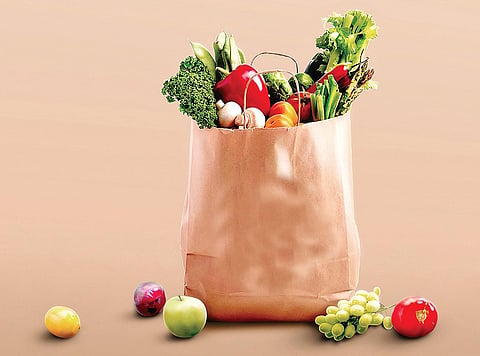

It’s upsetting when the hideously priced greens you order online or pick up from your local vendor, begin to sulk.
They wilt before you’ve even had a chance to carefully look at them. Here are smart cues to better the shelf life of vegetables.
The Leafy Lurch
It’s important to wash everything that comes from the market but that also makes vegetables prone to wilting faster.
But there are ways of avoiding it.
“Remove stems, thoroughly wash the leaves under running water, then dry on paper towels. Once the moisture exits, place in an airtight container lined with a paper towel. This will sap away residual moisture if any. Refrigerate. Use, and put the container back in the fridge immediately to keep leaves fresh for a week,” says dietitian Sarika Nair of SlimNhappy.
Sometimes we tend to buy in surplus, like three bunches each, to do a spot of budget shopping.
“Shelf life depends on the type of greens we buy too. For instance, mesclun perishes much quicker than amaranth leaves,” says Chef Rohan D’Souza, Culinary Director, Estella, Mumbai.
“Place basil, mint, thyme, and rosemary inside a damp cloth wrapped with cling film around the leaves, and stems in chilled water. As the days go by, trim the stems for a better life.”
Fresh curry leaves smell divine and work their magic even when dried crisp.
“Separate each leaf when you pick coriander,” says Nair. “Wash, dry, store when crisp in an airtight container. Do not refrigerate.”
What about other leaves, like palak and methi, that wilt and droop in hours after you drag in the shopping bags?
“Blanch spinach leaves for 30 seconds to a minute in hot water and dunk immediately in ice water.
"Then squeeze- dry the leaves and put into a zip lock bag and freeze,” she adds.
If you don't wish to freeze, then Chennai-based dietitian Deepalekha Bhattacharjee suggests storing them wrapped in a damp cloth.
Tubers, bulbs, pods
We tend to stock on drier vegetables, including garlic, onions and potatoes. Yet sometimes they brood in anger with a charcoal complexion or even sprout shoots.
“Don’t wash the tubers before storing. Wash them just before use,” advises Bhattacharjee. “Avoid storing onions with other tubers as sulphur content in onions can fasten the sprouting process in tubers.”
According to Mumbai- based Guntas Sethi Bhasin, Founder and Head Chef, Chef Guntas, “Whole bulbs of garlic will stay for several months when stored at room temperature in a dry, dark place that has ample air.
"However, if you remove the cloves from the bulb, store them in an airtight container in the refrigerator for a few days. Ensure there is plenty of dry air and little light to inhibit sprouting. To avoid mould, do not refrigerate or store garlic in plastic bags.”
The black soot on garlic is called Aspergillus niger, a type of fungus. It can develop due to improper handling and spoil it.
“Storing garlic at high temperatures and humidity can also lead to fungus. Humidity also leads to the sprouting of garlic,” explains Nair.
“Avoid storing onions near bananas or other fruits as it leads to degradation. Chopped onions can be stored in the fridge for around seven days. Avoid storing potatoes near onions and fruits.”
Chef Guntas adds, “A good way to make onions and potatoes last longer is to store them in brown paper bags or in wire mesh baskets for better air circulation. ” So go on, get ready to guard your foodie booty.